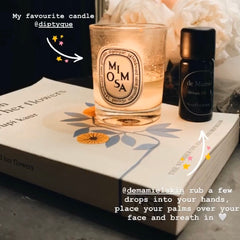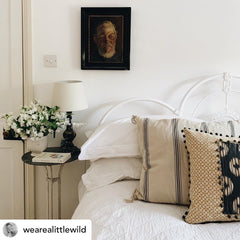Sleep And Mental Health Q&A With Tori
Tori is a training to become a Life Coach and in her own words is a 'mama, country girl, avocado addict, beach bum, a holistic badass' and she's got some amazing tips to get you sleeping soundly.

Last month, we have worked with Tori @wearealittlewild, who is training to be a Life Coach, to answer all your sleep & mental health questions.
Tori is a training to become a Life Coach and in her own words is a 'mama, country girl, avocado addict, beach bum and a holistic badass'.⠀
Adventuring frequently with her two sons in their campervan, Tori knows all about sleepless night's and exhaustingly long days but she mastered the art of bedtime bliss and when not conquering the waves with her sons, she's sleeping in her home sleep sanctuary, which, we can proudly say, contains our very own Florence Cast Iron Bed that Tori has had for the last decade.
One of Tori’s top tips is creating your very own sleep sanctuary at home.
Before you get into bed light your favourite scented candle to create beautiful smell in your bedroom, which will relax you, and set you up for sleep.
Before you get into bed light your favourite scented candle to create beautiful smell in your bedroom, which will relax you, and set you up for sleep.
Check out Tori's advice below on some of the most burning sleep questions that might keep you up at night.
Q: Is insomnia a mental health issue?
Tori says: I think the question to ask is why you are suffering from insomnia? Is there anxiety or stress involved in your day to day life that’s keeping you awake at night? If so then it’s good to gently sit down with yourself and figure out what’s playing on your mind. Insomnia is just the worst and sleep is absolutely vital to keeping your mind and body on an even keel.
Q: I can’t sleep. Does that mean I have a mental health issue?
Tori says: Again as mentioned above. If you can’t sleep you need to figure if there is something playing on your mind preventing you from sleeping. Lack of sleep massively affects your mental health. It’s so important. As important as drinking water. So start with why and go from there.
Q: How does lack of sleep affect anxiety?
Tori says: If you already suffer from anxiety it’s a given that a few sleepless nights will exacerbate the tensions and worries. Have you tried yoga or meditation for easing your anxiety? And I am a massive fan of journaling. Write it down. It might get you that restful night to give your brain some downtime.
Q: I feel tired during the day, but can’t sleep at night. What will help?
Tori says: That’s a really hard one and I get you. Exhaustion bites and then come bed time ‘ping’ wide awake! So frustrating. I suggest doing a few sleep hygiene measures religiously for a few weeks and see if it helps.
- Journal any worries playing on your mind. Start by listing three emotions you are feeling that day and then go into detail on why.
- Leave your phone outside of your room or if you need to use it for an alarm or clock switch it to airplane mode and silent. Also try not to have any screen time for a good hour before sleep. Read a book instead of scrolling or watching tv.
- Go to bed at the same time every night. And set your alarm for the same time every morning and get up. This will re-set your body clock.
- A hot bath before bed is a good way to wind down.
- Try a meditation to go to sleep. A really simple one is to close your eyes, breath in for 4 seconds and breath out for 6 seconds. Keep counting in for 4, out for 6.
Q: Can lack of sleep cause mental health issue?
Tori says: This is purely my personal opinion from experience, but long term lack of sleep, no matter how ‘healthy’ mentally or physically you are, is going to funk with you for sure.
Q: I struggle to fall asleep. What can help?
- Journal if you have worries.
- Create a sanctuary in your bedroom with fresh sheets, scents and calmness.
- Switch off your phone (airplane & silent mode).
- Religiously go to bed at the same time & set your alarm for the same time every morning.
- Try simple meditation breathing techniques. Close your eyes and breath in for 4 seconds, out for 6 seconds repeatedly. If you want to take it a step up try a meditation app like Insight Timer or Headspace for more meditation tools.
Q: I can’t wake up in the mornings. How can I be more active in the mornings?
Tori says: Ah I relate to this! I’m a night owl for sure, not an early bird. Don’t put crazy pressure on yourself to go go go. Ask yourself as to whether you are getting enough sleep? Could you go to bed earlier? Can you improve your sleep routine?
Q: I can’t sleep in the same bed as my partner. What do I do?
Tori says: This again is a hard one as it could be any number of reasons. Snoring. Discomfort. Stress. I recommend seeing a sleep therapist or your GP to discuss the best way forward.
Q: How much sleep is enough for good mental health?
Tori says: The recommended guidelines is 6-8 hours per night.
Q: Is 5 hours of sleep enough? I have a small baby.
Tori says: 5 hours in one block or 5 hours in a 24 hour cycle? 5 hours in one block plus a nap here or there is perfectly normal when you have little ones to look after. 5 hours in a whole day is low and depending on your other life demands I’d really see if you can snatch a little more sleep if it’s available to you. Rest when the baby rests. Your energy will be needed.
Q: Can sleep make mental health issue better?
Tori says: Depending on the issues, sleep is a primary factor in improving mental health.
Q: I use sleep to escape reality. Is that normal?
Tori says: I wish I could answer this one a bit better but without a full understanding of circumstances I’m limited. But I can say healthy sleep should be used and seen as a recharge and reset.
Q: What can I do to stay asleep through the night. I wake up a lot.
Tori says: Yes this is a hard one. Falling asleep is easy it’s falling asleep after waking half way through. I totally empathise with this. Do you know what is waking you? If it’s worrying thoughts/anxiety/stress, try following the sleep routine I list above.
Q: I have nightmares so I am afraid to go to sleep. What can help?
Tori says: Oh I’m sorry to hear this. Ok so let’s face these nightmares head-on. Try journaling your nightmares down. There is a train of thought that we are every person/part of a dream scenario. So for example, if you have a nightmare about say, witnessing a car crash, look at yourself in the dream. How do you feel? Now look at the driver of the car. How do you feel? Now, look at the car. What does it represent? Evaluate each side of that dream. It might give you an insight to your subconscious mind which in turn you will be able to soothe by further understanding your worries. Also, make your bedroom your sanctuary any way you can. Nice bedding. Candles (safely). A scent, like a pillow spray. Nice pyjamas. Make bedtime a ritual to look forward to and feel calm about. Take time to practice these things. I hope this helps.








